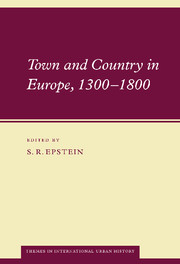Book contents
- Frontmatter
- Contents
- List of figures
- List of tables
- Notes on the contributors
- 1 Introduction. Town and country in Europe, 1300–1800
- 2 Town and country in Sweden, 1450–1650
- 3 Town and country in Holland, 1300–1550
- 4 Town and country in the Dutch Republic, 1550–1800
- 5 Town and country in England, 1300–1570
- 6 Town and country in England, 1570–1750
- 7 Town and country in the Polish Commonwealth, 1350–1650
- 8 Town and country in the Austrian and Czech lands, 1450–1800
- 9 Town and country in Germany, 1350–1600
- 10 Town and country in Switzerland, 1450–1750
- 11 Town and country in France, 1550–1750
- 12 Town and country in Castile, 1400–1650
- 13 Town and country in central and northern Italy, 1400–1800
- 14 Town and country in the kingdom of Naples, 1500–1800
- Index
6 - Town and country in England, 1570–1750
Published online by Cambridge University Press: 09 November 2009
- Frontmatter
- Contents
- List of figures
- List of tables
- Notes on the contributors
- 1 Introduction. Town and country in Europe, 1300–1800
- 2 Town and country in Sweden, 1450–1650
- 3 Town and country in Holland, 1300–1550
- 4 Town and country in the Dutch Republic, 1550–1800
- 5 Town and country in England, 1300–1570
- 6 Town and country in England, 1570–1750
- 7 Town and country in the Polish Commonwealth, 1350–1650
- 8 Town and country in the Austrian and Czech lands, 1450–1800
- 9 Town and country in Germany, 1350–1600
- 10 Town and country in Switzerland, 1450–1750
- 11 Town and country in France, 1550–1750
- 12 Town and country in Castile, 1400–1650
- 13 Town and country in central and northern Italy, 1400–1800
- 14 Town and country in the kingdom of Naples, 1500–1800
- Index
Summary
Introduction
By European standards, late sixteenth-century England was lightly urbanised; London aside, a land of small towns. Two centuries later England had become entrained in urban growth that was without European parallel. This transformation raises many questions about the town–country relations and the economic and cultural context within which it occurred.
Discussion of town–country relations involves tensions, sometimes contradictions, among themes of contrast (the divergent experiences of ‘town’ and ‘country’), diversity (a variety of experiences in particular places that undermines the categories ‘urban’ and ‘rural’) and integration (connections among places). There is no inevitability about how these themes are interrelated. For example, places frequently became increasingly differentiated as spatial divisions of labour increased within a more integrated economy, while other facets of spatial integration were associated with reduced diversity, such as the diffusion of more uniform attitudes to work or consumption. Moreover, a dualism of town and country may not provide the most important categories within which to analyse integration and differentiation. For example, analyses of industrial change may reject perspectives based on competition between urban and rural industries, in favour of an emphasis on changing regional town-country networks, and the intertwining of urban and rural life.
The chapter is divided into four main sections. The first section examines institutional factors bearing on town-country relations and regional economic change in early modern England, which have a lower historiographical profile than in continental Europe.
- Type
- Chapter
- Information
- Town and Country in Europe, 1300–1800 , pp. 132 - 155Publisher: Cambridge University PressPrint publication year: 2001

